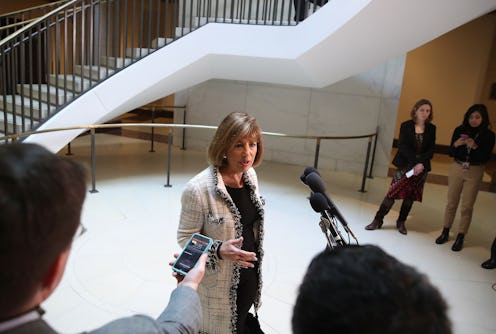News
How Rep. Jackie Speier Wants To Protect Female D.C. Staffers From Sexual Harassment

In recent weeks, social media and the mainstream media have been flooded with allegations of sexually predatory behavior by high-profile men, fueling the mega-viral hashtag #MeToo, and placing a spotlight on various forms of sexual violence. And on Friday, some current and former members of Congress joined the conversation, with three ex-members of Congress and one currently serving representative describing their own experiences being harassed. But some women working on Capitol Hill are even more at-risk than congresswomen are ― Rep. Jackie Speier wants to protect female congressional staffers, because they're much more vulnerable than lawmakers.
On Friday morning, a report from the Associated Press detailed sexual harassment allegations by Rep. Linda Sanchez, former Sen. Barbara Boxer, and former Reps. Mary Bono and Hilda Solis. The report broke the same morning that New York Sen. Kirsten Gillibrand announced she'll be proposing a bill aimed at revamping how the Congress handles allegations of sexual harassment, creating a new adviser position in the Office of Compliance, and making sexual harassment training mandatory, rather than voluntary.
The report also included a quote from Speier, which noted the "power" that women members of Congress possess as compared to their staffers. Speier has recently spoken out publicly about having been sexually harassed as a young staffer in her 20s, and she's referred to Capitol Hill as "a breeding ground for a hostile work environment."
"I think the women in Congress are big girls," Rep. Speier reportedly said, according to the AP. "The equalizer that exists in Congress that doesn’t exist in other settings is that we all get paid the same amount and we all have a vote, the same vote. So if you have members that are demeaning you it’s because you’re letting them."
Contacted on Friday afternoon, Speier clarifies her comment to Bustle, explaining that it wasn't meant to place blame on women members of Congress, or to diminish their experiences of harassment.
Rather, she says she was trying to emphasize the far greater vulnerabilities and risks that staffers on Capitol Hill face, absent the power and influence of elected officials.
"Women members of Congress have power," she says. "They have the ability to push back. They are not going to lose their jobs or be blackballed. I’m concerned about the staff, the interns and fellows who have no power, no ability to push back, and who are fearful of losing their jobs and incomes. I will say that a Congressmember hitting on another Congressmember is probably hitting on staff as well. By no means do I want to diminish the wrongful behavior by one member to another. Staff is just so much more vulnerable."
Gillibrand, the aforementioned senator from New York, is a particularly prominent example of a lawmaker who experienced sexual harassment from a male colleague. Back in 2014, she revealed that a male senator had made a demeaning remark about her body, although she declined to give his name. Subsequent reporting revealed that the man allegedly responsible was Daniel Inouye of Hawaii, a Democratic stalwart who passed away in office after serving nearly 50 years in the Senate.
It remains to be seen whether Gillibrand's bill will garner the bipartisan support it would need to be passed, and even further, whether President Donald Trump would sign it into law if it did. On the one hand, the notion of a president vetoing a bill explicitly intended to protect congressional employees and lawmakers from sexual harassment and assault sounds politically toxic in the extreme. On the other hand, Trump himself has been accused of sexually predatory behavior by more than a dozen women ― allegations he vehemently denies, calling his many accusers "horrible liars."